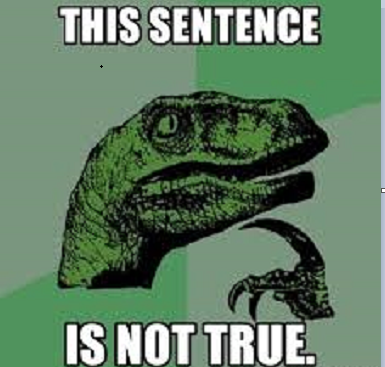
The following is a well-known paradoxical statement:
(A) The sentence A is not true.
That is just one — among many — formal expression of the Liar Paradox.
Yet isn’t it the case that statement A above has no semantic content? In other words, perhaps it’s not a real statement (or proposition) at all. Nonetheless, since many logicians and philosophers don’t take this view, let’s take it as they take it — as being a genuine (if paradoxical) statement.
The first thing to say is that A is self-referential. That is, like all expressions of the Liar Paradox, it’s about itself. (Here’s a list of other self-referential paradoxes.)
So we have the sentence “(A) The sentence A is not true” which includes the symbol A. The symbol A within the sentence stands for the sentence it is in (i.e., the words which surround it). In other words, a symbol within a sentence refers to the sentence which it is in.
Now is that acceptable? And is A even meaningful?
Statement (A) Has No Semantic Content

(A) The sentence A is not true.
Now what, precisely, “is not true”?
Sentence A is not true, apparently.
What does sentence A say about itself?
It says that it “is not true” — and that’s it. It doesn’t say its subject term (or phrase) “The sentence A” is “not true”: it says that the entire sentence “is not true”.
So if we take out the symbol A from the whole statement, this is what we’re left with:
The sentence [] is not true.
If the symbol A only refers to the sentence itself, then why can’t we take it out? However, if we do, then what are we left with?
It’s already been said that “The sentence A is not true” is without content: so it’s even more the case that “The sentence [] is not true” is without content.
We can boil this down even more.
The symbol A has been removed — and now we can remove the words “is not true” too. After all, the words “is not true” are supposed to be applicable to something else. So what are the words “is not true” applicable to? That’s right: they’re applicable to the two words, “The sentence”! This means that those two words are meant to be either true or false. Yet how can those two words alone be either true or false when they say almost — or literally — nothing?
Forget all that!
What Logicians Think About Sentence (A)
Let’s restate the sentence again:
(A) The sentence A is not true.
It’s meant to be the case that A couldn’t be true. Like all expressions of the Liar Paradox, it can’t be true because if what it says were true, then it would be false (i.e., “not true”). Yet if it were false, it must be true because A is saying that it’s not true.
On the other hand (or perhaps not), if we take the above to be false, then it must be true. After all, it it is saying that it isn’t true. That must mean, then, that it’s true. So a statement which says of itself that “it is not true”, is true.
Yet, despite all that, statement A can been rejected because it’s a pseudo statement in that it has no content. We can also say that it’s malignly self-referential. Or, more correctly, that truth can’t be applied (or used) self-referentially — especially when the statement has no content in the first place!
What about a sentence which is both (seemingly) self-referential and which does have content?
Take this example, which is borrowed from the Polish logician and mathematician Alfred Tarski:
(S) The sentence “Snow is white” is true if and only if snow is white.
The problem here is that the sentence above isn’t really a single sentence (or statement) at all. It is in fact two statements. That is, we have “Snow is white” as well as “This sentence ‘Snow is white’ is true”. Thus it isn’t self-referential at all. The metalanguage’s “The sentence [] is true” is being applied to the object language’s “Snow is white”. The statement “Snow is white” clearly has content and the whole sentence “The sentence ‘Snow is white’ is true if and only if snow is white” isn’t self-referential either because there’s both a meta-sentence and an object-sentence.
Yet, as stated earlier, many logicians and philosophers defend the “The sentence A is not true” paradox for two main reasons:
1) The words “is true” constitute an acceptable English predicate.
2) The whole sentence (A) is grammatically “unassailable”.
So perhaps it isn’t philosophically acceptable. And we can also reject its (everyday) grammar too.
Again, the argument is that we can grammatically assert the sentence A and also grammatically apply the words “is not true” to it. However, all that depends on what’s meant by the words “we can grammatically assert the sentence”. Can we? Grammar, unlike logic, is largely about what is acceptable to say in order to make sense. Now “This sentence” (or “This sentence A is not true”) isn’t grammatically acceptable for precisely the reasons given. It’s roughly equivalent to saying “I walk down” (or “This is”) — and no teacher of English grammar would accept this locution on its own or without any sentential (or semantic) context. (The words “This is” or “I walk down” could be deemed to be elliptical.)
Conclusion
Of course logicians can — and do — treat statements such as “Bricks have a sense of humour” or “The number 2 is blue” logically. That is, they can assign a truth value to such statements and then treat them as pure syntactic strings — from which they can derive further statements and conclusions. Similarly, we can programme the words “The number 2 is blue” into a computer and then that computer can grind out further statements and indeed even a conclusion (i.e., if it’s programmed in the right way).
So we have statement A, which is seemingly grammatical and literally logical. However it has no semantic content. Indeed it can also be said that we can’t really call it a statement at all. Isn’t it simply an arbitrary string of words which obey a logical or grammatical form and which has then had a truth value assigned to it? (Actually, unlike “The number 2 is blue”, A has contradictory truth values assigned to it!) At most, then, statement A is (merely?) a logical string.
It can be concluded, then, that this is why we have the questions and problems which are highlighted by the philosophy of logic. And the philosophy of logic is over and above pure (or formal) logic.










No comments:
Post a Comment